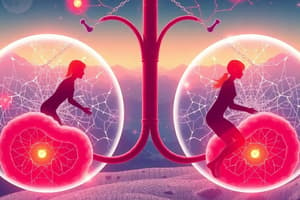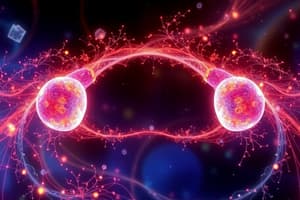Podcast
Questions and Answers
What initiates the twin cycle hypothesis in Type 2 Diabetes Mellitus (T2DM)?
What initiates the twin cycle hypothesis in Type 2 Diabetes Mellitus (T2DM)?
- Decreased caloric intake
- Early insulin resistance (correct)
- Enhanced energy storage in the liver
- Impaired insulin secretion from beta cells
Which organ primarily stores energy in the form of triglycerides?
Which organ primarily stores energy in the form of triglycerides?
- Skeletal muscle
- Pancreas
- Liver (correct)
- Visceral fat
What happens to circulating nutrients during the first cycle of T2DM?
What happens to circulating nutrients during the first cycle of T2DM?
- They are converted into stored glycogen in adipose tissue.
- They become less available due to enhanced lipid metabolism.
- They are rapidly cleared by skeletal muscle.
- They remain longer in the bloodstream. (correct)
What role do elevated circulating free fatty acids (FFA) play in T2DM?
What role do elevated circulating free fatty acids (FFA) play in T2DM?
Which factor exacerbates insulin resistance in T2DM according to the twin cycle hypothesis?
Which factor exacerbates insulin resistance in T2DM according to the twin cycle hypothesis?
What is a consequence of prolonged insulin secretion during the first cycle of T2DM?
What is a consequence of prolonged insulin secretion during the first cycle of T2DM?
What is one of the key organs involved in the lipid and glucose metabolism dysregulation in T2DM?
What is one of the key organs involved in the lipid and glucose metabolism dysregulation in T2DM?
How does insulin resistance affect adipose tissue in T2DM?
How does insulin resistance affect adipose tissue in T2DM?
What is the primary factor linked to fibrosis in the pancreas associated with T2DM?
What is the primary factor linked to fibrosis in the pancreas associated with T2DM?
What are the potential consequences of a fatty pancreas?
What are the potential consequences of a fatty pancreas?
What effect can dietary restriction have on pancreatic health in T2DM?
What effect can dietary restriction have on pancreatic health in T2DM?
How does excess fat accumulation affect beta cells according to the research?
How does excess fat accumulation affect beta cells according to the research?
What is a proposed mechanism of 'beta cell burnout' in T2DM?
What is a proposed mechanism of 'beta cell burnout' in T2DM?
The accumulation of which fatty acid is specifically linked to pancreatic beta cells?
The accumulation of which fatty acid is specifically linked to pancreatic beta cells?
What relationship exists between hepatic steatosis and pancreatic fat in T2DM?
What relationship exists between hepatic steatosis and pancreatic fat in T2DM?
What hormonal change is associated with beta cells acting more like alpha cells?
What hormonal change is associated with beta cells acting more like alpha cells?
What is the primary fate of elevated free fatty acids (FFAs) in the liver?
What is the primary fate of elevated free fatty acids (FFAs) in the liver?
What is the consequence of hepatic steatosis in the liver?
What is the consequence of hepatic steatosis in the liver?
Which lipoprotein is primarily responsible for exporting energy from the liver?
Which lipoprotein is primarily responsible for exporting energy from the liver?
Which apoproteins are key components of VLDL?
Which apoproteins are key components of VLDL?
What is the overall function of LDL in the circulatory system?
What is the overall function of LDL in the circulatory system?
What triggers the twin cycle hypothesis related to Type 2 Diabetes Mellitus (T2DM)?
What triggers the twin cycle hypothesis related to Type 2 Diabetes Mellitus (T2DM)?
Which of the following statements about VLDL is correct?
Which of the following statements about VLDL is correct?
What is the main consequence of insulin resistance in relation to hepatic steatosis?
What is the main consequence of insulin resistance in relation to hepatic steatosis?
Which lipoprotein is primarily synthesized by the liver and contains mostly triglycerides?
Which lipoprotein is primarily synthesized by the liver and contains mostly triglycerides?
What is a likely effect of having high levels of LDL that are not cleared from circulation?
What is a likely effect of having high levels of LDL that are not cleared from circulation?
What happens to adipose tissue when it reaches its limit in fat storage?
What happens to adipose tissue when it reaches its limit in fat storage?
Which two substances' ratio increases in insulin resistance and contributes to poor food intake regulation?
Which two substances' ratio increases in insulin resistance and contributes to poor food intake regulation?
What is a key feature of the twin cycle hypothesis regarding T2DM?
What is a key feature of the twin cycle hypothesis regarding T2DM?
What happens to liver function as a result of accumulating lipid in insulin-resistant individuals?
What happens to liver function as a result of accumulating lipid in insulin-resistant individuals?
How do elevated circulating free fatty acids (FFAs) affect hepatocytes under insulin-resistant conditions?
How do elevated circulating free fatty acids (FFAs) affect hepatocytes under insulin-resistant conditions?
What role does palmitic acid play in the context of insulin resistance?
What role does palmitic acid play in the context of insulin resistance?
What misconception exists regarding pancreatic function in Type 2 Diabetes Mellitus (T2DM)?
What misconception exists regarding pancreatic function in Type 2 Diabetes Mellitus (T2DM)?
In the context of T2DM, what is a significant consequence of fat accumulation in the pancreas?
In the context of T2DM, what is a significant consequence of fat accumulation in the pancreas?
What metabolic characteristic defines the 'twin cycle' in the context of T2DM?
What metabolic characteristic defines the 'twin cycle' in the context of T2DM?
What is the relationship between ectopic fat deposition and insulin resistance?
What is the relationship between ectopic fat deposition and insulin resistance?
What potential effect does steatosis in the liver have on pancreatic function?
What potential effect does steatosis in the liver have on pancreatic function?
What weight loss percentage was achieved by participants in the DiRECT trial after 12 months?
What weight loss percentage was achieved by participants in the DiRECT trial after 12 months?
What caloric intake was prescribed during the initial phase of the DiRECT trial?
What caloric intake was prescribed during the initial phase of the DiRECT trial?
Which group was able to achieve weight loss in the DiRECT trial?
Which group was able to achieve weight loss in the DiRECT trial?
What treatment strategy was implemented at the start of the DiRECT trial for participants?
What treatment strategy was implemented at the start of the DiRECT trial for participants?
What was the design of the DiRECT trial?
What was the design of the DiRECT trial?
What is a potential consequence of beta cell de-differentiation in Type 2 Diabetes Mellitus?
What is a potential consequence of beta cell de-differentiation in Type 2 Diabetes Mellitus?
What is one explanation for the reversal of Type 2 Diabetes Mellitus related to pancreatic health?
What is one explanation for the reversal of Type 2 Diabetes Mellitus related to pancreatic health?
What role does triglyceride delivery via VLDL play in pancreatic health?
What role does triglyceride delivery via VLDL play in pancreatic health?
Which factor is linked to the phenomenon known as 'beta cell burnout'?
Which factor is linked to the phenomenon known as 'beta cell burnout'?
What is the primary cause of increased oxidative stress in beta cells associated with a fatty pancreas?
What is the primary cause of increased oxidative stress in beta cells associated with a fatty pancreas?
What dietary intervention has been shown to improve pancreatic health in cases of fatty pancreas?
What dietary intervention has been shown to improve pancreatic health in cases of fatty pancreas?
What type of stress is significantly increased in pancreatic beta cells due to excessive fat accumulation?
What type of stress is significantly increased in pancreatic beta cells due to excessive fat accumulation?
How does the presence of excess free fatty acids (FFAs) impact pancreatic function in T2DM?
How does the presence of excess free fatty acids (FFAs) impact pancreatic function in T2DM?
What is the most significant consequence of the lipid accumulation in non-adipose tissues, particularly in the liver?
What is the most significant consequence of the lipid accumulation in non-adipose tissues, particularly in the liver?
What adaptive response occurs in adipose tissue in individuals with insulin resistance?
What adaptive response occurs in adipose tissue in individuals with insulin resistance?
What is a notable effect of elevated VLDL levels in relation to cardiovascular health?
What is a notable effect of elevated VLDL levels in relation to cardiovascular health?
How does the interaction between leptin and adiponectin affect appetite regulation in T2DM?
How does the interaction between leptin and adiponectin affect appetite regulation in T2DM?
What is the primary metabolic consequence of hepatic steatosis in individuals with T2DM?
What is the primary metabolic consequence of hepatic steatosis in individuals with T2DM?
In the twin cycle hypothesis, what drives the impaired clearance of lipoproteins in T2DM?
In the twin cycle hypothesis, what drives the impaired clearance of lipoproteins in T2DM?
What is one primary function of very-low-density lipoproteins (VLDL) produced in the liver?
What is one primary function of very-low-density lipoproteins (VLDL) produced in the liver?
Which of the following best describes the relationship between elevated free fatty acids (FFAs) and insulin resistance?
Which of the following best describes the relationship between elevated free fatty acids (FFAs) and insulin resistance?
What role do elevated circulating free fatty acids (FFAs) play in the liver during T2DM?
What role do elevated circulating free fatty acids (FFAs) play in the liver during T2DM?
Which statement best captures the significance of ectopic fat deposition in T2DM?
Which statement best captures the significance of ectopic fat deposition in T2DM?
What is the consequence of hepatic steatosis for the liver's metabolic function?
What is the consequence of hepatic steatosis for the liver's metabolic function?
What misconception exists about pancreatic tissue in the context of T2DM?
What misconception exists about pancreatic tissue in the context of T2DM?
During elevated free fatty acid (FFA) levels, what is one way the liver can manage this influx?
During elevated free fatty acid (FFA) levels, what is one way the liver can manage this influx?
Which of the following best describes how steatosis impacts blood glucose levels in T2DM?
Which of the following best describes how steatosis impacts blood glucose levels in T2DM?
What is a key characteristic of the twin cycle hypothesis related to T2DM?
What is a key characteristic of the twin cycle hypothesis related to T2DM?
What is the primary difference between LDL and VLDL in their metabolic roles?
What is the primary difference between LDL and VLDL in their metabolic roles?
What factor is associated with the stress on hepatocytes in T2DM, particularly related to elevated FFAs?
What factor is associated with the stress on hepatocytes in T2DM, particularly related to elevated FFAs?
How does the liver respond to chronic high levels of circulating free fatty acids?
How does the liver respond to chronic high levels of circulating free fatty acids?
What is a likely effect of having high levels of VLDL in the bloodstream?
What is a likely effect of having high levels of VLDL in the bloodstream?
Flashcards are hidden until you start studying
Study Notes
Twin Cycle Hypothesis and Type 2 Diabetes Mellitus (T2DM)
- T2DM involves a transition from insulin resistance to the loss of beta cell mass due to dysregulated lipid and glucose metabolism across multiple organs.
- Early insulin resistance initiated by excess caloric intake and impaired nutrient clearance by skeletal muscle triggers the twin cycle hypothesis.
First Cycle - The Liver
- Diabetic patients reach a “tipping point” when normal energy storage becomes saturated.
- Energy should ideally be stored in subcutaneous fat, muscle, liver, and some in visceral fat; insulin receptors must be sensitive for effective storage.
- Positive energy balance leads to skeletal muscle and subcutaneous fat insulin resistance, resulting in prolonged elevated glucose and free fatty acids (FFAs) in circulation.
- Elevated FFAs cause the liver to respond by either burning energy (beta oxidation), storing it (hepatic steatosis), or exporting it (VLDL production).
- Insulin resistance creates an imbalance between glucagon and insulin in liver physiology, causing lipid accumulation, increased gluconeogenesis, and enhanced VLDL export.
Consequences of Insulin Resistance in Liver
- Increased liver fat leads to inappropriate gluconeogenesis and heightened blood glucose levels, further straining pancreatic insulin secretion.
- Elevated circulating FFAs, especially palmitic acid, activate Toll-like receptors (TLRs) exacerbating insulin resistance in hepatocytes.
Second Cycle - The Pancreas
- Pancreas changes in T2DM, including intrapancreatic fat accumulation, have become better characterized; fatty infiltration around acinar cells is common.
- The liver delivers excess triglycerides (TGs) to the pancreas, correlated with fibrosis and fat accumulation, particularly affecting pancreatic beta-cells.
- Fatty pancreas may lead to apoptosis or dedifferentiation of beta-cells; excess fat and glucose may alter beta-cell function, mimicking alpha-cell behavior.
Positive Feedback Loop in T2DM
- Insulin resistance increases hepatic steatosis and VLDL output, causing triglyceride and FFA accumulation in the pancreas, compromising insulin secretion.
- Resulting hyperglycemia promotes fat conversion and further increases circulating FFAs, worsening the diabetic state.
Endogenous Lipid Pathway Insights
- VLDL, primarily formed by the liver, consists of triglycerides, phospholipids, cholesteryl esters, and proteins (ApoC-II, ApoA-V) for peripheral lipoprotein lipase (LPL) activity.
- IDL is generated as VLDL loses triglycerides and is cleared largely by the liver via ApoE receptors on hepatocytes.
- LDL, being primarily cholesterol-rich, is also cleared by the liver and can oxidize if not cleared, escalating atherosclerosis risk.
Adipose Tissue Saturation
- Subcutaneous fat has a capacity limit for triglyceride storage influenced by genetics, age, and sex.
- In insulin resistance, adipocytes are less effective at storing triglycerides, releasing FFAs instead.
- Adiponectin secretion by subcutaneous fat doesn’t keep pace with leptin from both fat types, leading to higher leptin/adiponectin ratios and poor regulation of food intake.
Evidence and Challenges
- The twin cycle hypothesis is comprehensive and complex, presenting challenges in proving due to its detailed nature and the various interactions involved.
The Liver's Response to Elevated FFAs
- The liver handles elevated free fatty acids (FFAs) through three pathways: beta oxidation for energy, storage as hepatic steatosis, or exporting via Very Low-Density Lipoprotein (VLDL) production.
- Hepatic steatosis, or fat accumulation, is an undesirable condition linked to metabolic disorders.
- VLDL characteristics include being rich in triglycerides and containing apoproteins like ApoB-100, ApoA-V, and ApoC-II for lipid transport and metabolism.
Insulin Resistance and Liver Function
- Insulin resistance involves disrupted glucagon and insulin signaling rather than merely inhibiting insulin.
- Long-term insulin resistance, such as in Type 2 Diabetes Mellitus (T2DM), leads to lipid accumulation in the liver, worsened gluconeogenesis, and hyperglycemia.
- Elevated circulating FFAs from insulin-resistant adipocytes are taken up by hepatocytes, leading to increased triglyceride production and VLDL export, compounding metabolic issues.
The Twin Cycle Hypothesis
- The pancreas plays a critical role in T2DM progression, characterized by intrapancreatic fat accumulation affecting insulin secretion.
- Initial hypotheses suggested that increased fat within the pancreas leads to apoptosis of beta-cells, but newer studies also consider beta-cell de-differentiation as a potential factor.
- Improvements in T2DM have been linked to decreases in pancreatic fat and liver steatosis.
Feedback Loop in Metabolic Dysfunction
- A negative feedback loop exists: insulin resistance causes hepatic steatosis and heightened VLDL output, leading to fat buildup in the pancreas, impaired insulin secretion, and worsening hyperglycemia.
- Lipotoxicity from elevated FFAs exacerbates insulin resistance and overall metabolic dysfunction.
Endogenous Lipoprotein Pathway
- VLDL, synthesized in the liver, predominantly contains triglycerides and apoproteins (ApoC-II, ApoA-V, and ApoB-100) essential for triglyceride metabolism.
- As VLDL loses triglycerides, it forms Intermediate-Density Lipoprotein (IDL) and eventually Low-Density Lipoprotein (LDL), which is cleared by liver receptors.
- Accumulation of non-cleared LDL can lead to oxidation, increasing atherosclerosis risk.
Subcutaneous Fat and Insulin Resistance
- Adipose tissue has a limit on fat storage, affected by genetic and demographic factors.
- Insulin resistance diminishes the ability of adipocytes to store triglycerides, increasing FFAs in circulation.
- The balance of adipokines secreted by fat tissue (leptin and adiponectin) becomes disrupted in T2DM, worsening appetite regulation and insulin sensitivity.
DiRECT Trial Findings
- The DiRECT trial involved 306 T2DM participants undergoing a structured weight-loss program, highlighting significant metabolic improvements.
- Participants in the intervention group lost an average of 15 kg or more within 12 months, emphasizing the potential for weight loss in reversing T2DM effects and improving health outcomes.
Studying That Suits You
Use AI to generate personalized quizzes and flashcards to suit your learning preferences.




